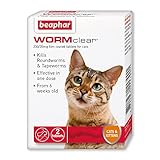Best Cat and Kitten Wormers
Cats can get worms, like roundworms and tapeworms. There are actually eight different kinds that can infect your cat. Some can even spread to humans, you know.
A few worms aren’t usually a big deal. Cats often don’t even show signs. But if there are lots of worms, things change. You might see vomiting, diarrhea, or weight loss. In bad cases, it can even cause death.
So, cat owners should treat their pets regularly. This helps stop worms or get rid of them. We’ll look at different treatments here. We’ll also review the best cat wormers in the UK. These will help keep your cats and kittens healthy.
Our Top Picks
We’ve picked out the best-rated cat and kitten wormers from this guide. You can read our full reviews, and see pictures, further down this page.
Best Worming Tablets: Beaphar WORMclear for Cats 5/5
Best wormer for kittens: Beaphar Worming Syrup for Kittens 4.5/5
How often should you worm your cat
Kittens need worming early, starting at 3 weeks old. Treat them every two weeks until they reach 6 months. After that, treatments can happen every 1 to 3 months.
For cats older than 6 months, regular worming is still important. They should get treated for both roundworm and tapeworm every 1 to 3 months. For our own cats, we treat them about every 10 weeks.
Best Cat & Kitten Wormer Reviews
Lots of different wormer types exist for cats. You’ve got spot-ons, tablets, granules, and even syrups or liquids. We’ve tried many of them. For our cats, tablets usually work best.
We’ve listed all types of wormers in our reviews below. We picked out the best ones available in the UK. Take a look.

Best Worming Tablets for Cats & Kittens: Beaphar WORMclear for Cats
Our Rating: 5/5
Beaphar WORMclear tablets are for cats and kittens 6 weeks and older. Just one dose takes care of worms. They kill both roundworms and tapeworms, which covers all 8 common types of intestinal worms. Pretty neat, right?
The box gives you two meat-flavored, film-coated tablets. These can last from one month to six months, depending on your cat’s age. Kittens need treatment every two weeks until about two or three weeks after they stop nursing. Adult cats should get treated every three months to stay worm-free.
These tablets are about 1cm across. You can easily cut them along the ridge. If your cat won’t swallow pills, you can crush them and mix with food. That’s what we did, our cats are particular!
For the price, these tablets are really cheap. They make worming your cat easy and affordable.
Best Kitten Wormer: Beaphar Worming Syrup for Kittens
Our Rating: 4.5/5
Beaphar Worming syrup is for roundworms only. Good thing, since roundworms are what you usually find in kittens under 6 months. Tapeworms typically show up in older cats. This syrup is perfect for little kittens, even from 2 weeks old.
The bottle has a pump dispenser. This makes it super easy to measure the dose. You can also squirt it right into your kitten’s mouth corner. No fuss.
One pump gives you exactly 1.1ml. A simple chart tells you how many pumps your cat needs. We used this syrup on both kittens and puppies. It’s a really good way to worm them.
Worming kittens can be tricky, right? This syrup helps a lot. You can give it straight or mix it with milk or food. Most tablets aren’t for kittens under 6 weeks. So, we think this syrup is the best choice for very young kittens.
Bob Martin Clear Wormer Tablets
Our Rating: 4/5
These dewormer tablets from Bob Martin are great for fighting tapeworm and roundworm issues. They’re good for cats and kittens over three months old. The tablets are large and oval. For kittens, you’ll need to break them in half so they don’t choke.
You get two tablets in a box. One dose can keep your cats worm-free for up to 10 weeks. You give one tablet every five weeks. If you have a few cats, it’s best to get separate doses for each. This helps you keep track of their deworming schedule.
The tablets are quite affordable. So, treating several cats won’t cost you a fortune. Just remember to do a small test first. See if your cat reacts badly to it.
Bob Martin Clear spot on wormer
Our Rating: 4/5
Tapeworm problems are pretty common for most cats. This Bob Martin wormer is made specially to fight tapeworms. It’s not expensive, and it uses praziquantel to kill the worms.
It’s easy to use, you just put it on your cat’s neck. But, some cats might have a reaction. So, it’s a good idea to put a tiny bit on their neck first. Watch them for 24 hours. If they don’t react, then you can safely use the rest of the treatment. It’s best for cats weighing over 1kg.
Bob Martin Spot on dewormer
Our Rating: 4/5
This cat wormer is a good choice for value and quality. It’s super cheap, which is always nice, and it works well too. The special tube makes application simple. And the best part? That low price gets you two tubes.
If you’re on a tight budget and can’t go to the vet for deworming pills, this cat dewormer will do fine. You don’t need a prescription to buy it. Just like always, do a small test first. See if your cat reacts. If not, you’re good to go.
Bayer – Droncit Dog & Cat Tapeworm Tablets
Our Rating: 4/5
If your cat doesn’t mind taking tablets, these are a good choice. This cat wormer works for all types of tapeworms. It’s also much cheaper than what you’d get from the vet.
The box has ten tablets. They should last you up to 3 months. Before giving the full dose, break off a small piece. Give it to your cat to see if they react. Cats can have drug allergies, just like people. If your cat reacts, buy a different dewormer. If not, go ahead with the full dose.
Make sure your cats have plenty of water. This helps their bodies break down the tablets so they work faster.
Best Spot On Wormer for Cats: Spot on Tubes for Cats
Our Rating: 4.5/5
No products found.
Got a fussy cat who hates pills? This is probably your best bet. This cat wormer goes on the skin. It’s also very affordable. It starts working fast, you’ll see a difference within 24 hours.
The pack contains four tubes. Each tube is for a cat weighing 2.5kg. So, if your cat is heavier or you have more than one, you’ll need to figure out how many tubes. The tubes are easy to use, so you won’t struggle with your cat.
Just pop the tube from its foil, twist off the lid, and use the top of the lid to pierce the seal. Then, apply it to your cat’s neck without any fuss. Toss the empty tube in the bin. It’s a simple, stress-free way to protect your cat from tapeworm.
Where do cats get the worms from
Worms come from different places, depending on the type. Here’s how some spread:
- Heartworms: Mosquitos carry and transfer these.
- Tapeworms: Cats get these by eating contaminated food.
- Lungworms: Your cat can get these by eating a host animal that has the worm. They then live in the cat’s lungs.
- Hookworms: These live in the intestines. Cats get them from eating bad food or skin contact with an infected animal.
- Roundworms: Cats can get these from eating contaminated food. Kittens often get them from their mother’s milk when nursing.
Identifying worms
Roundworm and tapeworm are the most common kinds of worms you’ll see. It’s usually easier to spot roundworms. They are long, thin, and often visible. They can grow up to 10cm, but that’s pretty rare. You might see white roundworms in your cat’s poop or around their butt.
Tapeworms are smaller. They look like tiny white grains of rice. You might find them around your cat’s anus, in their feces, or in their bedding.
Your cat will also show physical signs if they’re infected:
- They might lose weight, even if they’re eating normally.
- Their stomach could look swollen.
- Their fur might lose its shine, appearing rough and coarse.
- Worms can cause discomfort. Your cat might drag their bottom across the floor. If you see this, check for worms.
- If your cat is wheezing or coughing, see your vet. This can be a sign of lungworm. If not treated, lungworm can be deadly.
Preventing worms
Don’t wait until your cat shows worm signs. Try to stop them before they start:
- Treat your cat for fleas. Fleas often carry worms. If no fleas, less chance of worms.
- Worm them regularly, even if they look healthy. Your vet can advise the best plan. Here’s a general idea:
- Kittens: Treat monthly from 6 weeks old. Then, from 6 months old, every 3 months.
- Adult cats: Worm every 2 to 6 months.
Good hygiene also helps prevent worms:
- Don’t leave uneaten food out too long. Throw it away and give fresh food.
- Clean food and water bowls often. Use animal-safe disinfectant.
- Keep your house clean. This gives your cats a healthy place to live.
Worms aren’t pleasant, but they’re usually easy to treat. They don’t often cause lasting harm. If you think your cat has worms, treat them fast. Always ask for vet advice on the best treatment. Preventing worms is always better, so make regular worming a habit. Don’t miss a dose.
In Conclusion
Worming your cats is a key part of keeping them healthy. Worms can really hurt your cat’s health because they fight for food. So, if your cats don’t get wormed regularly, they’ll start to lose weight.
Some worms, like hookworms, can build up in the small intestines. They might even block them. This is super painful for cats. They’ll have constant belly aches, bloating, and constipation. If their intestines get blocked, your cat will need surgery to remove the worms. You really don’t want your cat to go through that.
As a cat owner, remember a few things if you think your cat shows worm signs:
- Figure out what kind of worms your cat likely has, depending on where they might have gotten them.
- Look for the best medicine that works well and isn’t too pricey.
- Find the easiest way to give the wormer to your cat. Pills or skin applications, whatever your cat prefers.
- Look for other ways to stop future worm problems. Like, keep your house and bowls clean. This prevents your cat from eating bad food.



















